Socrates was executed by the Athenian court in 399 B.C.E. on allegations of impiety and corrupting the youth.
The decision looms over Athens’ legacy as a city lauded for its intellectual and political independence. However, the motives for Socrates’ execution are questionable in and of themselves.
To begin with, the allegation of heresy is a broad accusation that would be unlikely to result in a conviction on its own. Similarly, the second claim of corrupting the youth is unclear and devoid of meaningful evidence.
Instead, Socrates’ friendship with two violent oligarchic dictators is a crucial cause of his execution.
His frequent criticism of Athens’ civic system and critical citizens breeds hostility toward his public presence.
Finally, the unrest in Athens following the oligarchic revolution of 404 B.C.E. heightens the desire to destroy sources of dissent, such as Socrates.
Thus, Socrates’ execution by the Athenians is motivated by latent political objectives rather than explicit charges of impiety and corrupting the youth, which come to a head in 399 B.C.E.
Why was Socrates assassinated?
Content
Socrates was sentenced to death after being convicted of corrupting the youth of Athens. He chose not to leave and spent his dying days with his friends before sipping the executioner’s cup of lethal hemlock.
Who charged Socrates with his crimes against the Athenian way of life?
Socrates’ Apology opens with Socrates addressing the jury of perhaps 500 Athenian males, asking if they had been persuaded by the Orators Lycon, Anytus, and Meletus.
They have accused Socrates of corrupting the city’s youth and impiety against the pantheon of Athens.
Who said Socrates was the wisest man alive?
Socrates said his buddy Chaerephon went to the oracle Delphi and asked if there was anyone smarter than Socrates.
No one is wiser than Socrates was perplexed by this news since he couldn’t believe he was the wisest.
The Trial of Socrates
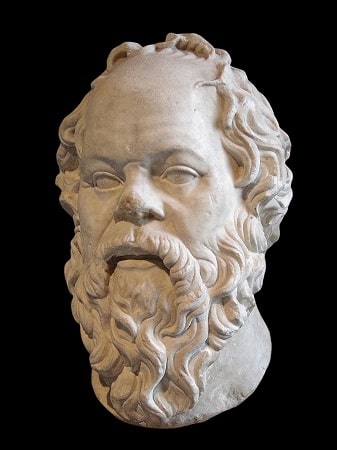
In 399 B.C, Socrates was put on trial under the guilt of two major charges: impiety against Athens’ pantheon and the corruption of the city-state’s youth. He showed a lack of respect towards religion and deities by refusing to recognize the city deities and also introducing new deities.
Socrates’ death sentence was the legal repercussion of asking his students’ politico-philosophical questions, culminating in the two indictments of moral depravity and impiety.
The dikasts, or the male jurors chosen by a lot, decided on convicting Socrates and agreed to a death sentence for the two charges of impiety and corruption. They agreed upon giving the poisonous wine of Hemlock to Socrates.
Before the philosopher Socrates was prosecuted for moral degradation and impiety, Athenians knew him as an intelligent and moral outcast in their society.
Aristophanes portrays Socrates as a sophisticated philosopher who instructs the young man Pheidippides on how to make justifications to justify striking and beating his father in the comedy-drama The Clouds (423 BC).
Despite Socrates’ denial that he had any connection with the Sophists, the dramatist implies that Athenians identified Socrates’ philosophic teachings with Sophism.
Socrates left no written works; nonetheless, Plato, his pupil, and friend composed Socratic dialogues with Socrates as the protagonist.
Competing intellectuals despised Socrates’ elenctic examination method for intellectual inquiry as a teacher because its inquiries jeopardized their legitimacy as men of wisdom and virtue.
The young men of Athens frequently imitated Socrates’ elenctic technique.
The First Charge – Asebeia (impiety) Against the Pantheon of Athens
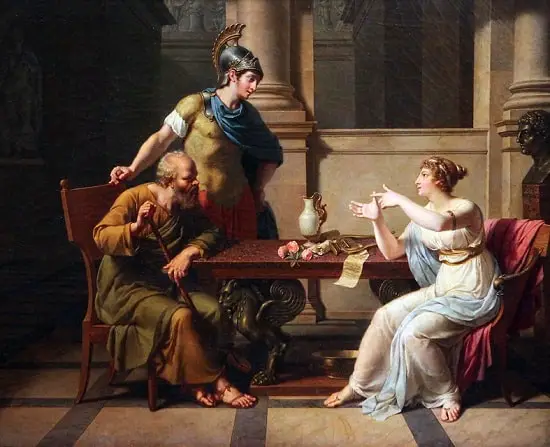
Regardless of how practical Plato’s explanation is, the specific allegation of impiety is not the reason for Socrates’ execution.
“Socrates is accused of not acknowledging the gods recognized by the city and inventing other new divinities,” begins the first section of Socrates’ indictment.
Such an accusation would have been easily understood in a society with a well-established official religion, such as that prevalent in medieval Europe.
On the other hand, Classical Greece had many gods and goddesses who changed throughout antiquity.
For example, even after attaining Athenian citizenship, foreigners, non-citizens, and enslaved people continued to follow diverse religions and worship unofficial gods within the city of Athens.
Indeed, foreign religions are freely accessible and frequently embraced by the city’s population.
Consider the behavior of citizens during the Peloponnesian War between Athens and Sparta to successive outbreaks of plague.
Citizens were so desperate to avoid what they believed to be the gods’ wrath that they openly indulged in blasphemy, such as following “ventriloquist prophets.”
These ventriloquists were very popular in the decades leading up to Socrates’ trial, and they contributed to the overall ambiguity of what piety meant.
Indeed, by 399 B.C.E., not even Meletus, Socrates’ prosecutor, knew what impiety meant. The religious culture of Athens was tolerant of foreign deities and open to new religious beliefs.
Aside from the ambiguous meaning of purity, criticizing Athenian deities was widespread in the fifth century B.C.E. The denigration of gods in poetry and comedy plays exemplifies this technique.
In his Oresteia trilogy, Aeschylus depicts the Greek god Zeus in a negative light. Without fear of repercussions, poets such as Euripides and Pindar refuted Greek myths.
Mocking the gods in the most public places of the Athenian polis was standard practice during this period, and the playwrights and poets who perpetrated such sacrilege were not charged with blasphemy.
As a result, the allegation of impiety was not enforced under Athenian law. As a result, it was unlikely to be a genuine accusation against Socrates.
The Second Charge – Corrupting the Youth
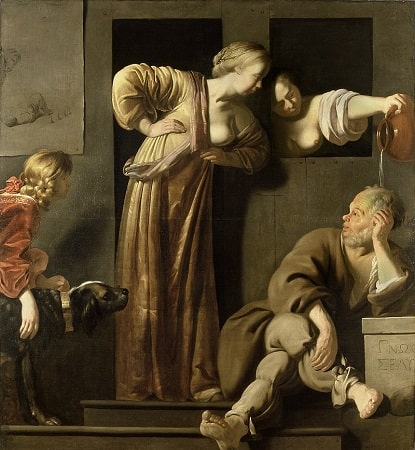
As the accusation of impiety, the charge of corrupting the youth is a vague and unfounded attack on Socrates that could not have resulted in his execution by the Athenians in 399 B.C.E.
This second claim alleges that Socrates discouraged the youth from showing respect to their parents and instead directed them toward dishonorable behavior.
This accusation is based primarily on the assumption that Socrates was a sophist or a teacher who instructed students for a fee, primarily in the skill of rhetoric.
The sophists are widely reviled for their deceptive use of language to “make the weaker argument appear stronger.” On the other hand, Socrates lacks all of the traits that identify a sophist.
To begin with, he teaches at a public school, as opposed to the sophists, who had private schools.
Former student Xenophon explains that “Socrates lived ever in the open” because “he went to the public promenades and training fields early in the morning, in the forenoon he was seen in the market, and the rest of the day he spent just where most people were to be encountered.”
Socrates spent the entire day in the Athenian agora, addressing everyone who would listen; “young or old, he is not excluded.”
Furthermore, these public debates imply that Socrates did not charge a fee, unlike the sophists, who admitted only wealthy students who could afford the charges.
Socrates goes so far as to assert that “not even the impudence of [his] accusers dares to say that [he] ever exacted or solicited compensation from anyone; of that, they have no witness.”
Finally, Socrates differed from the Sophists in that he practiced without a formal teaching curriculum.
Whereas the sophists gave a formal education that resulted in a degree, Socrates questioned individuals he desired to enlighten.
His subjects and methods changed based on the replies of each individual, and he was fundamentally informal and constantly changing. Socrates’ teaching style was fundamentally different from the sophist system’s.
Furthermore, he refutes the charge of corrupting youth by showing no witnesses. “Those grown up and understand that he offered them evil counsel in their youth are invited to come forward as accusers and take their revenge.
Even though many of Socrates’ former students and their relatives are present at the trial, no witness steps forward to testify against him.
One may argue that no former pupil or family there thought he was corrupting the youth.
As a result of the contrast between Socrates and the sophists and the prosecution’s failure to provide a single witness to support their claim, it is clear that Socrates was not guilty of corrupting the youth.
As a result, this claim could not have been the basis for his conviction. The stated charges of not following religious practices and corrupting the children are not justifiable justifications for Socrates’ execution.
On the contrary, Socrates’ death was motivated by ulterior political motivations, as given below.
Political Motivations for Socrates’ Execution
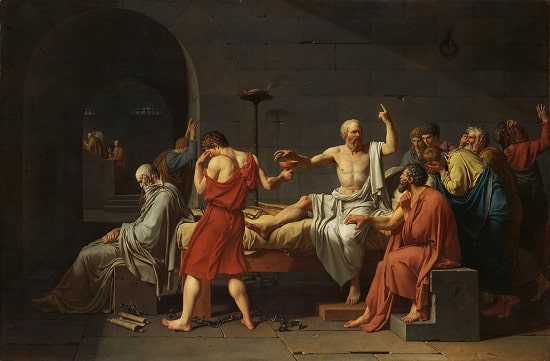
Socrates’ close relationship with two prominent oligarchic figures and a famous traitor who joined the Spartan cause during the Peloponnesian War was a primary political motivator for his execution.
In 404 B.C.E., oligarchic politicians took over Athens and established the ‘Thirty Tyrants,’ or simply the ‘Thirty.’
Critias and Charmides, two prominent leaders of this oligarchic movement, were both disciples of Socrates before entering politics.
When Athens reestablished itself as a democracy in 403 B.C.E., the oligarchs were deposed, and a general amnesty was declared, shielding everyone except the most senior oligarchic officials from punishment.
This amnesty, however, did not imply that the Thirty’s harsh rule had been forgotten. If the banished democrats returned to the city, they were unlikely to forget their harsh treatment and material losses quickly.
They are likely to seek retaliation against any oligarchic allies. Socrates’ position as the instructor of these prominent oligarchic personalities made it look like he backed the Thirty’s authority.
Furthermore, Socrates remained uninjured in Athens during the tumult, even though up to 1500 affluent citizens were slaughtered and thousands more were deported.
The Thirty Tyrants and Alcibiades
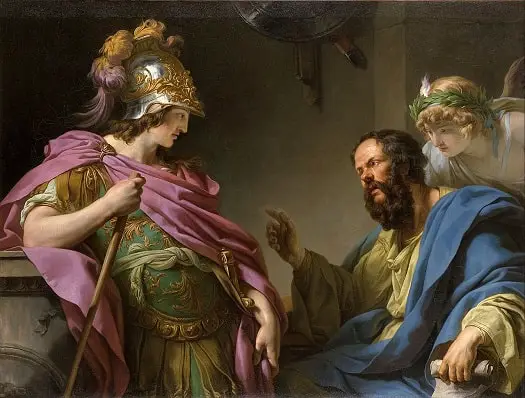
Alcibiades, the Athenian general, was philosopher Socrates’ student and a close friend. They were in the same mess during the 423 to 429 BC.C Potidaea.
Alcibiades, after being summoned to trial, managed to escape to Sparta but had to escape from Sparta to Persia for having an affair with the wife of the Spartan King.
However, in 400 B.C. he was killed in Phrygian by the Spartan rivals. Alcibiades before being assassinated was driven out of Athens immediately after the Spartan’s defeat in the battle of Notium.
Another potential source of anger was the political beliefs that he and his colleagues were known to hold.
Critias, who appears in two of Plato’s Socratic dialogues, was a member of the Thirty Tyrants (the cruel oligarchic administration that controlled Athens as Spartan puppets and was backed by Spartan forces for eight months in 404–403 BC until it was toppled).
Several of the Thirty had been Socrates’ students, but there is also documentation of their falling out.
Like many other problems surrounding his conviction, Socrates’ association with the Thirty Tyrants is far from clear. Many famous Athenians hostile to the new regime departed Athens during the Thirty’s reign.
Given the availability of a welcoming host outside of Athens, Socrates elected to remain in Athens, at least in part.
Thus, according to Waterfield, Socrates’ contemporaries likely considered his remaining in Athens, even if he did not participate in the Thirty’s bloodthirsty plots, reflected sympathy for the Thirty’s cause rather than neutrality.
Conclusion
The assassination of Socrates left a stain on the fabric of Athenian society, a shame that nearly grew 80 years later with similar threats of impiety directed at Aristotle, determined not to let Athens “sin twice against philosophy.”
This fundamental sin against philosophy has been commemorated in philosophy classrooms for millennia to come, transforming the character of Socrates into the figure of Jesus in Christian theology.
Since then, several interpretations of the reasons for his sentencing have emerged.
